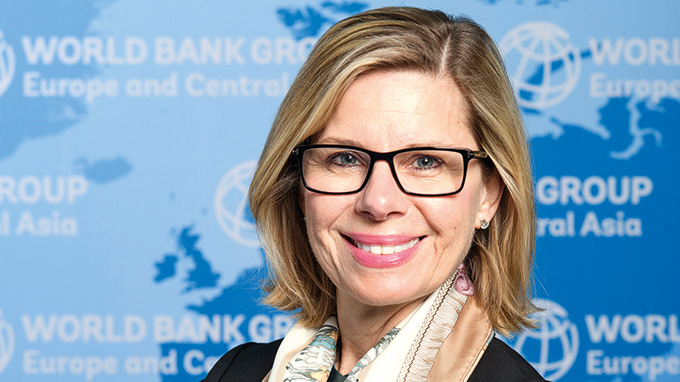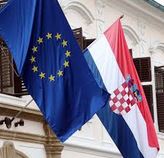[vc_row][vc_column width=”1/2″][vc_column_text]
Croatia
The light green area is the rest of the European Union
Croatia was the 74th largest economy in the world by nominal GDP in 2018. GDP per capita is $14,869 USD. A member of the former Yugoslavia it joined the EU in 2013. Since independence, tourism has emerged as a key industry. Services was the largest economic sector in 2018 (58 percent of GDP), followed by manufacturing (11.9 percent), and agriculture (2.9 percent). In 2017, the largest export sectors were services (49 percent), agriculture (11.2 percent), and chemicals (8.24 percent). The largest individual exports were travel and tourism (35 percent), and ICT services (9.6 percent). Its largest export partners were Italy (11.6 percent), Germany (11.4 percent), Slovenia (10.15 percent), and Bosnia (9.8 percent). The largest goods imports were crude oil (6.45 percent), refined petroleum (4.5 percent), cars (4.43 percent), and electrical energy (3.12 percent). Croatia's economy suffered badly during the Croatian War of Independence. On top of the transition from the Yugoslav socialist economy, it lost the key market of Serbia for its manufactured products, and tourism collapsed. After the war, the economy recovered reaching growth of over 6 percent. It was led by macroeconomic stabilisation, a rebound in tourism, post-war reconstruction, and credit-driven consumer spending. Privatisation also played an important part helping to push the share of the private sector from 30 percent to 80 percent by the end of the 1990s. Exports however were not increasing and by 1998 an external balance crisis developed and when the government responded with tighter monetary policy the economy went into recession. In the 2000s the economy again grew strongly buoyed by strong capital flows and domestic credit growth but public debt also increased leaving the economy exposed when the global financial crisis hit. By 2015, growth had recovered, and since then fiscal reforms have helped reduce imbalances. Unemployment has also been falling but further gains can be made by increasing the low participation rate. Reforms in education and increased investment in research and development will also help future growth.
[/vc_column_text][vc_column_text] Its population in 2018 was 4,164,783 [1]
Its population in 2018 was 4,164,783 [1]
 In 2015, 33.13% of its total energy
In 2015, 33.13% of its total energy
consumption was renewable [2]
 In 2021, its GDP grew by 10.45% [2]
In 2021, its GDP grew by 10.45% [2]
 In 2021 it had a positive Current
In 2021 it had a positive Current
Account Balance of US$bn 1.38 [3]
 Its unemployment rate in 2021 was 8.17% [3]
Its unemployment rate in 2021 was 8.17% [3]
 Its Expenditure on R&D (as a percentage of
Its Expenditure on R&D (as a percentage of
GDP) in 2020 was 1.25% [2]
 A Big Mac will set you back the
A Big Mac will set you back the
local equivalent of US$3.24 [4]
What free trade areas or economic unions is it a member of?
Member of the European Union (EU) since 01/07/2013
Other members:
Austria, Belgium, Bulgaria, Cyprus, Czechia, Denmark, Estonia, Finland, France, Germany, Greece, Hungary, Ireland, Italy, Latvia, Lithuania, Luxembourg, Malta, Netherlands, Poland, Portugal, Romania, Slovakia, Slovenia, Spain, Sweden
What trade deals are there between European Union and other countries and economic unions?
EU - Andorra Customs Union (from 01/01/1991)
European Single Market (SM) (from 01/01/1993)
EU - Sri-Lanka Co-operation and Partnership Agreement (from 01/04/1995)
EU - Türkiye Customs Union (from 31/12/1995)
EU - Faroe Islands Agreement (from 01/01/1997)
EU - Palestinian Authority Interim Association Agreement (from 01/07/1997)
EU - Tunisia Association Agreement (from 01/03/1998)
EU - Armenia Partnership and Cooperation Agreement (from 09/09/1999)
EU - Morocco Association Agreement (from 01/03/2000)
EU - Israel Association Agreement (from 01/06/2000)
EU - Mexico Global Agreement (from 01/10/2000)
EU - San Marino Customs Union (from 01/04/2002)
EU - Jordan Association Agreement (from 01/05/2002)
EU - North Macedonia Stabilisation and Association Agreement (from 01/04/2004)
EU - Pakistan Co-operation agreement (from 29/04/2004)
EU - Egypt Association Agreement (from 01/06/2004)
EU - Chile Association Agreement and Additional Protocol (from 01/03/2005)
EU - Algeria Association Agreement (from 01/09/2005)
EU - Lebanon Association Agreement (from 01/04/2006)
EU - Albania Stabilisation and Association Agreement (from 01/04/2009)
EU - Pacific States Interim EPA (from 20/12/2009)
EU - Montenegro Stabilisation and Association Agreement (from 01/05/2010)
EU - Central America Association Agreement (from 01/08/2013)
EU - Serbia Stabilisation and Association Agreement (from 01/09/2013)
EU - Bosnia and Herzegovina Stabilisation and Association Agreement (from 01/06/2015)
EU - South Korea Free Trade Agreement (from 01/07/2015)
EU - Kosovo Stabilisation and Association Agreement (from 01/04/2016)
EU - Georgia Association Agreement (from 01/07/2016)
EU - Moldova Association Agreement (from 01/07/2016)
EU - Canada Comprehensive Economic and Trade Agreement (CETA) (from 21/09/2017)
EU - Eswatini (SADC) Economic Partnership Agreement (from 05/02/2018)
EU - Lesotho (SADC) Economic Partnership Agreement (from 05/02/2018)
EU - Mozambique (SADC) Economic Partnership Agreement (from 05/02/2018)
EU - Namibia (SADC) Economic Partnership Agreement (from 05/02/2018)
EU - South Africa Economic Partnership Agreement (from 05/02/2018)
EU - Botswana (SADC) Economic Partnership Agreement (from 05/02/2018)
EU - Japan Economic Partnership Agreement (from 01/02/2019)
EU - Eastern and Southern Africa States free trade agreement (from 07/02/2019)
UK - EU Trade Deal (from 01/01/2021)
[/vc_column_text][vc_column_text]What trade deals are there with other countries and economic unions?
None
[/vc_column_text][/vc_column][vc_column width=”1/2″][vc_column_text]World Bank Vice President for Europe and Central Asia: Interview with Anna Bjerde
Working Together to Boost Innovation in Central Europe and the Baltics
From Croatia to Chile – The Luksic Family: From the World’s Driest Desert to the Forbes List
World Bank Group: Spurring Job Growth in the Western Balkans – Research and Innovation
EU Welcomes Croatia
World Bank Group: Create Jobs by Focusing Industries to be Competitive
Trade with the United Kingdom
Source: UK Office for National Statistics, October 2022.
Contains public sector information licensed under the Open Government Licence v3.0.
Loading, Please Wait!
This may take a second or two.





















































































